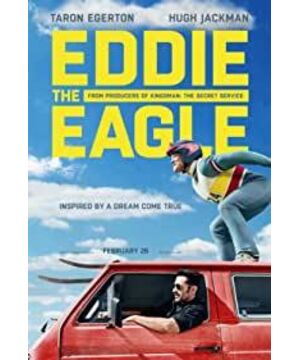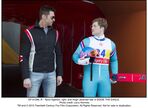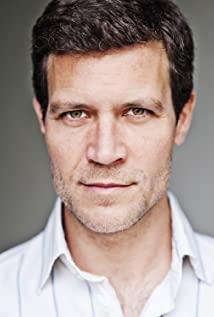Robert McGee said in "The Story": "The distinguishing feature of comedy characters is blind attachment." The protagonist of this story is such a recognized waste that is so persistent to dreams that it makes people feel weird. A summary of the film on Imdb is: The story of Eddie Edwards, the notoriously tenacious British underdog ski jumper who charmed the world at the 1988 Winter Olympics. Adding a notoriously modification in front of tenacious is really worthy of fun, Notoriously has two meanings of "bad reputation" and "well-known". How to interpret it is probably a pun related to the controversial archetype in reality. Yes, the reality of Eddie’s terrible results has turned into a hot spot in the 1988 Winter Olympics. Is it a spiritual victory or a media farce. But as a movie, it is a movie that puts aside the controversy of the archetypes. The characterization is actually It serves to express the theme, so the brilliance of the film lies in the design of the fictional coach Bronson Peary played by Uncle Wolf. His interaction with Eddie adds a little drama to the film, and more importantly. It’s a good way to consolidate the theme of the story through the changes of the two characters. This is also my favorite place. I have to say that Matthew Vaughan really can tell stories, no matter "Ace Agent" or this one, it is He doesn't play cards according to the routine, but he always keeps the clichés in mind and is very refreshing.
Speaking of the theme, the director’s questions have reached the point of blatantly, from the protagonist's personal practice, to letting Uncle Wolf read it out of the book, to the end of the film, the subtitle is directly on: The most important thing in life is not triumph but struggle. I'm really afraid that the audience will not get it. To-the greatest meaning of life is not victory but hard work. Because "victory" is defined by others, and "struggle" comes from the heart. As the coach said before Eddie's last jump, fly for yourself, not for the audience.
Yes, this is not a story about perseverance and never giving up, and the dream will eventually be realized, and it is not a story about a genius who is instructed to reach the pinnacle of life. Whether in the movie or in reality, our protagonist is not a genius, and he has never been able to realize his childhood dream of becoming an Olympic champion. Even though the Olympic president praised Eddie in the closing ceremony, the Olympic organizing committee Later, it was true that because of the Eddie incident, the selection rules were immediately revised to prevent too amateur players from adding chaos. After Eddie became famous in the 1988 Winter Olympics, he also struggled until 1998 and was never again selected for world-class events. , He is really not the material of the Olympics. But because he is as ordinary as you and me, it makes us believe that from pursuing self-realization to facing up to the self and still sticking to the original aspiration, even if you fail, you will not give up fighting. This is the time when you really take off.
During Eddie's growth, the director spared no effort to show us how to tell the protagonist "you can't" in a tricky manner, so that the counter-effect helped the protagonist realize his dream. As Eddie said, "They said I would never be an athlete, but I want to prove to everyone that they were wrong." This also made us doubt in the first half that it was for the Olympics to make Eddie work so hard. The love itself is just to fight for the tone.
When Eddie and the coach had a conflict, fortunately, the film did not go like a general legendary sports film. The protagonist gave up the immediate opportunity, took four years of courage, practiced hard, and exerted his talents, and finally succeeded in winning the Olympic championship. Such a turning point laid the groundwork for the following article. Coach Peary's inner dilemma is undoubtedly revealed. The importance of Eddie's success is more like the hope of regaining his lost glory. Peary values the success or failure of the world, such as his teaching. What the mentor suggested was that this might be the source of his loss of control and degeneration. Seeing this, maybe we also expect Eddie to be a genius who can win honor for both of them, but the ending tells us Eddie is mediocre. Looking back at this moment, we see that Peary becomes blind because of fear of failure. But at this time, Eddie is no different from Peary. The defeat in the qualifiers made him lightly give up ski jumping and give up his obsession with the Olympics. Facing the unexpected turnaround, his paranoia made us feel that he might not care what Peary did. He cares about the victory, but he cares very urgently to prove himself, as long as he can stand on the Olympic arena, and this may be the only opportunity in his life.
Therefore, when he completed the 70-meter platform, he thought he had won. The audience and the media cheered him, but he did not win the respect of his teammates. In their eyes, Eddie was more like grandstanding, and Eddie proudly wanted to share his success. Joy to his coach, but Peary slightly disappointed and sarcastically told him to enjoy this 15-minute fame. At this time Eddie was urged to look at his heart. The short-lived vanity was not the purpose of his coming to this arena. "Think of every jump as his last jump." He knew better than anyone else that he worked hard all the way. What was it for and what he paid for the Olympics? Maybe years of cold-eyed observation made him lost. When he looked at the Olympic track alone, he found his true source of courage.
Therefore, Eddie’s self-realization is not at the moment when he completes the 70-meter platform to prove to all those who look down on him that he can do it, but at the moment when he is determined to participate in the 90-meter platform competition. The film has repeatedly rendered the danger of the 90-meter platform and strengthened the transformation implied by his decision. He is pleased because he loves the sport he is engaged in from the heart. He does his best because he has a dream for his own dream It has nothing to do with the persistence of winning or losing and cheering. This is what Eddie taught Peary. Therefore, the theme of the film is not the choice of the protagonist. The transformation of coach Peary is the best interpretation of the theme, and this moment allows people to truly appreciate Eddie. With admiration, he truly won the respect of his opponents.
There are many interpretations of sportsmanship in various movies. Challenging oneself is a common theme. It can stay on simply breaking through the limits of the body, but what is more advanced is not the desire and persistence for success, but not fear of failure and follow. The courage to do everything in his heart and even kill his life. Probably no sport can better interpret flying and falling, and the first step in a real take-off is to overcome the timidity that the higher you fly, the harder you fall. It is precisely because Eddie can do it, you and I can do it, that's the moving part of this movie. At the Olympics, after each jump of Eddie, the commentator excitedly said the words "personal best" time and time again. The Olympic spirit and sportsmanship do not lie in the rankings, but in these words, the director puts the film in The intention permeates every detail meticulously.
Finally, I like the paradox of the platform jumping competition. When a person flies, he wants to fly farther and fall more firmly, not by standing up and opening his arms, but by trying to lower his body. Perhaps the enduring charm of sports themes lies in the fact that the process of breaking through the limits of the body itself is the best interpretation of the philosophy of life.
In the end, I want to say, Taron has a promising future. First, he got Uncle Face, and Uncle Wolf. He has a good cp feeling with Uncle. It is simply a harvester of male gods. In addition, in order to see Uncle Wolf's whole piece of 1.8 meters long legs and no bottom line, you have to go to see it too!
Attached is a picture of CP show affection holding legs
View more about Eddie the Eagle reviews











